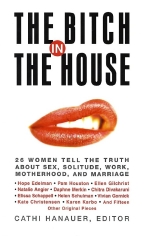The Bitch in the House: 26 Women tell the truth about
sex, solitude, work, motherhood and marriage
Harper Collins
US Paperback
ISBN: 0-06-093646-0
Pages: 294; Price: $13.95
Date Reviewed: 26th January 2004
Reviewed by: Serena Trowbridge © 2004
|

|
|
REFERENCES
|
COLUMNS
|
|
Non-Fiction
|
|
Germaine Greer says, in "The Whole Woman", that the women's
movement should harvest women's sadness, rather than anger. The
Sixties and Seventies saw angry women, fighting for the right to have
it all, but now, she says, what women suffer from is sadness, and the
power of their tears is infinite. She's right, in many ways, but the
anger, it seems, hasn't gone away; it's just changed direction. The
Bitch in the House looks at the domestic anger experienced by women
in contemporary society, and I hadn't realized what a widespread
phenomenon this was. I leave whatever book I'm reading in my in-tray,
and every woman I know seems to have picked this one up, read the
back, and asked if she can have it after me, so clearly the topic is
one that strikes a chord.
The title, says Hanauer, is taken from Virginia Woolf's essay,
"Killing The Angel in the House", about the necessity for the
emancipation of women from the shackles of the kitchen. However, the
"Angel in the House" comes from an earlier source, Coventry Patmore's
excessively Victorian poem "The Angel in the House", extolling the
virtues of the woman who is the subservient goddess of home and
hearth.
Cathi Hanauer became aware of the anger that women were feeling
with regard to their day-to-day lives, and asked a series of women,
mostly writers, to produce an essay on this. The result is a series
of fresh, lively pieces filled to bursting with down-to-earth
honesty, about the things that women usually don't talk about. The
book is divided into sections - "Me, Myself, and I", "For Better and
Worse", "Mommy Maddest" and "Look at Me Now". They all deal with
pretty much the same thing, though - what to do when you have it all,
and it's just too much hard work. Some of it I really agreed with,
some of it seemed a bit too out there for me, but I just couldn't put
it down.
The writers look at the choices they have made in their lives,
what behavior they learned from their mothers, and what they found
works for them. These are all motivated, ambitious women with great
careers, wonderful partners and children they adore, and yet their
lives are spiraling out of control. It's time, they say, to let go of
the idea that we have to do everything, be responsible for everyone,
and simultaneously be an earth-mother, a perfect hostess, a loving
wife, a successful career woman, and a woman in one's own right. Put
like that, it makes life sound impossible, and yet thousands of women
make just that happen in their lives - it's no wonder there's some
anger involved somewhere along the line, not to mention a bit of
madness.
I did feel that this book would have benefited from some cogent
analysis about why this is a problem in our society, and how society
as a whole could move on from it. Apart from a brief fore- and
after-word there is nothing to draw the strands together - but maybe
that's the point - we have all these choices, all these things to
think about, and this is another one we have to make up our own minds
about. Is it women's feeling of powerlessness in domestic situations,
or is it men's laziness? Or is it a combination of the two in a
have-it-all society? Personally I think that perhaps anger is the
inevitable result of our struggle, our aspirations and our social
conditioning. We are still brought up to want to get married, and we
increasingly still aspire to be the domestic goddess; but at the same
time, we know now that we are also creative, businesslike, effective,
and strong - and somehow it's very difficult to mix the two. The
combination is often explosive.
In some ways, this is a slightly depressing book; it's about what
goes wrong in relationships, and frequently not what is positive, and
what can last. Those women who have found solutions to their
situations seem to have find the kind of answers that I'm interested
to read about but wouldn't want myself - open marriages, being a
mistress, long distance relationships etc. Having said that, it is
something that needs to be discussed, and with luck it will open up
conversations and save relationships. I still believe that most
problems in relationships turn out to be only a fraction of the
problem we thought it was, once it is openly and frankly discussed,
and perhaps that is the most enduring message of this book.
You can find out more at the
website - where another interesting book, edited by Cathi
Hanauer's husband, Daniel Jones, is advertised:
The Bastard on the Couch: 27 Men Try Really Hard to Explain their
Feelings about Love, Loss, Fatherhood and Freedom
